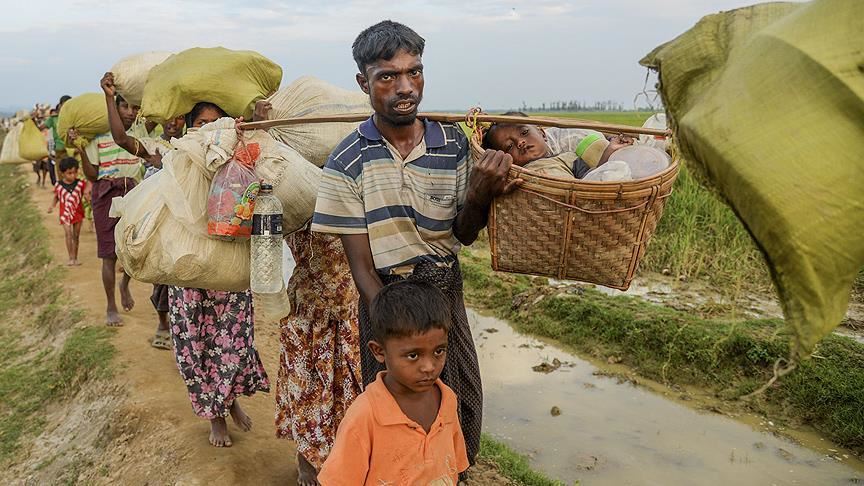
ANKARA
The world is ignoring the Rohingya crisis for several reasons, said an NGO leader in Canada on Friday, citing in particular the alliance of Myanmar's government with China, India, Israel, and Russia as well as the global climate of Islamophobia.
"Both India and China have a strategic economic interest in Myanmar. The Myanmar government recently agreed to the China-Myanmar Economic Corridor (CMEC) agreement, which is part of China’s Belt and Road Initiative," Yuriko Cowper-Smith, a board member at the NGO Canadian Rohingya Development Initiative (CRDI), told Anadolu Agency.
Starting in China’s Yunnan province, Cowper-Smith explained, the economic corridor goes through Mandalay and Yangon, and reaches Myanmar’s coast at the Kyaukphyu Special Economic Zone (SEZ) in Rakhine state, the site of a brutal 2017 crackdown on the Rohingya.
“Neither India nor China would want to upset this status quo with any sort of international intervention, and so neither government will broach the Rohingya issue with the Burmese [Myanmar] government, let alone the United Nations," she added.
"Therefore, the UN Security Council avenue is closed as a possibility."
She downplayed any expectations of the U.S. or NATO taking action, saying: "The likelihood of this option seems low, as President Trump is not a fan of the UN system or of transnational justice."
She added: "Although a Muslim nation, which has a significant Rohingya refugee population, Saudi Arabia also has economic interests in Rakhine state, which lessens the likelihood of them speaking out against the Burmese state."
Cowper-Smith added that the global climate of Islamophobia, fear of terrorism, as well as the lack of access to Rakhine state by international observers lessens the likelihood of international involvement.
Rohingya meeting
NGOs, human rights activists, academics, and lawyers convened in Toronto, Canada last month to discuss the progress since the release of a report by Canada's special envoy to Myanmar in 2018.
Bob Rae's report -- Tell them we are human: What Canada and the world can do about the Rohingya crisis -- was published last year to draw attention to the humanitarian crisis faced by Rohingya refugees who have been fleeing systematic persecution by Myanmar’s army and government.
Experts discussed several key issues related to the crisis such as the lack of coordinated international response against Myanmar, urgent issues in the refugee camps, and the steps Canada could take to alleviate the plight of Rohingya refugees.
According to the experts, if the international community fails to take immediate action, the following problems will only get worse:
- Exploitation, human trafficking, systemic rape by Myanmar officials and soldiers in refugee camps
- Lack of access to health and schooling
- Urgent need for flood-resistant, cyclone-resistant housing
- Mental, physical, and psychological trauma
Experts agreed to sustain the dialogue on the Rohingya and also recommended putting international court pressure on the Myanmar army.
International Rohingya observers say the generals in Myanmar’s army are worried about the possibility of being prosecuted for crimes against humanity.
Recommendations to Canadian officials
Experts recommended establishing better relationship with political parties and the Canadian public to raise awareness of the crisis.
They also urged Canadian authorities to provide scholarships and a pathway to resettlement for Rohingya students in Canada.
Participants added that Canadian officials should continue to work with Bangladesh to allow refugee visas, especially to women and children.
Persecuted people
The Rohingya, described by the UN as the world's most persecuted people, have faced heightened fears of attack since dozens were killed in communal violence in 2012.
According to Amnesty International, more than 750,000 Rohingya refugees, mostly women and children, have fled Myanmar and crossed into Bangladesh after Myanmar forces launched a crackdown on the minority Muslim community in August 2017.
Since Aug. 25, 2017, nearly 24,000 Rohingya Muslims have been killed by Myanmar’s state forces, according to a report by the Ontario International Development Agency (OIDA).
More than 34,000 Rohingya were also thrown into fires, while over 114,000 others were beaten, said the report, titled "Forced Migration of Rohingya: The Untold Experience".
Some 18,000 Rohingya women and girls were raped by Myanmar’s army and police and over 115,000 Rohingya homes were burned down and 113,000 others vandalized, it added.
The UN has also documented mass gang rapes, killings – including of infants and young children – and brutal beatings and disappearances committed by Myanmar state forces.
In a report, UN investigators said such violations may have constituted crimes against humanity and genocidal intent.
Anadolu Agency website contains only a portion of the news stories offered to subscribers in the AA News Broadcasting System (HAS), and in summarized form. Please contact us for subscription options.

